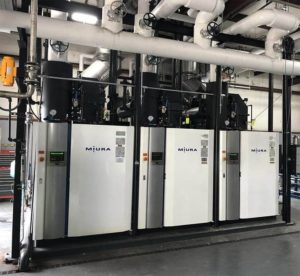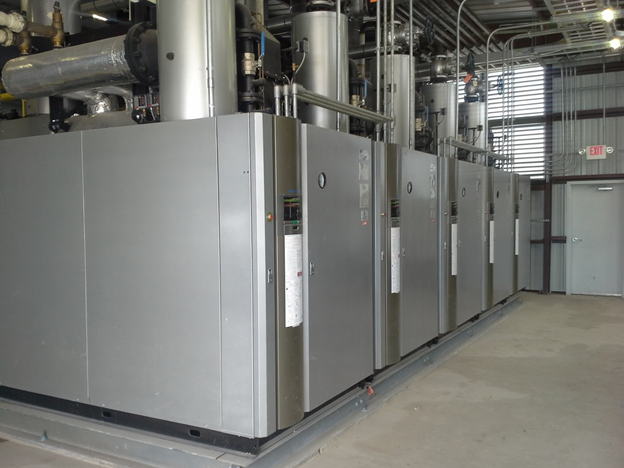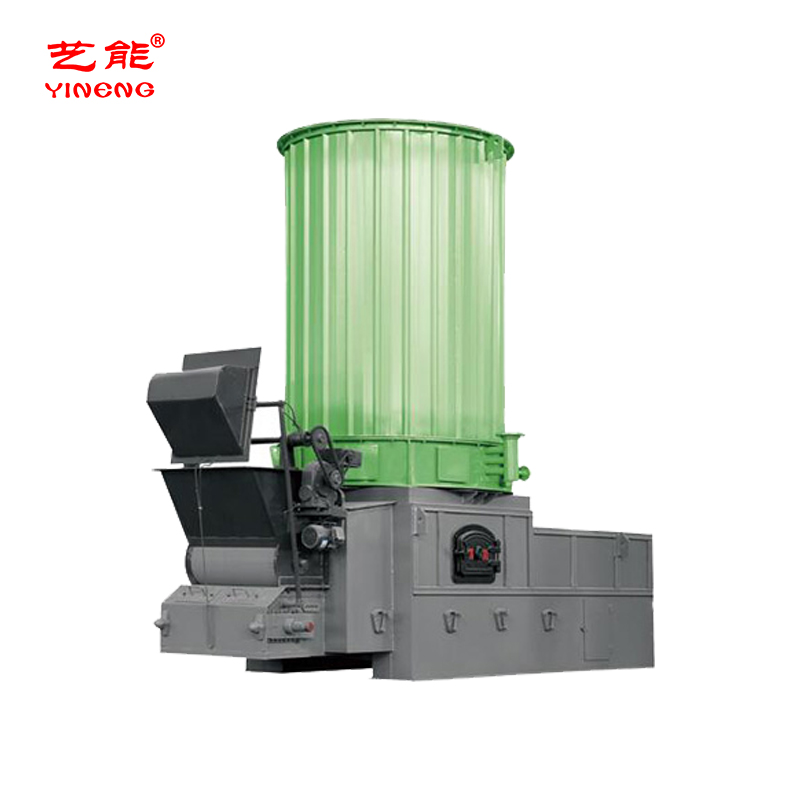MOST COMMON STEAM BOILER TYPES
From steam engines to home heating systems to hot water heaters, people have been using boiler systems to provide steam heating and hot water for centuries. At first glance, it may seem like all steam boilers are more or less the same — but the fact is that steam systems can be quite different from one another. Some boilers run on natural gas, while others use heating oil or propane. There are both high pressure and low-pressure boilers, and there are some that can do either. Boiler systems may operate with differing minimum water levels and at different levels of energy efficiency.
BREAKING DOWN STEAM BOILER TYPES

There are several general types of boilers with varying qualities and differing boiler designs to serve different purposes. Before you can have an idea of which boiler is right for your facility, you should become acquainted with several of the more common types of steam boilers.
FIRE TUBE BOILER
The most common type of boiler system especially for industrial uses, fire tube boilers, has been around for a long time because of their ability to meet steam needs when the demand is large and constant. These pressure vessels are filled with water, and the fuel used to heat the water is kept inside a series of tubes. The key to a fire tube boiler is having the boiler, burner, and control scheme all working in conjunction with one another to produce the steam and pump it where it needs to go. They are common for any steam or hot water application that requires between 15 and 2,200 horsepower.
Vertical YLL coal fired chain grate thermal oil boiler
While extremely common, fire tube boilers are not without their downsides. They are designed to heat large amounts of water at once, so it may take several hours after startup before the proper steam pressure is reached. This boiler design can be cumbersome and expensive for industries that require steam only at certain times of day, not to mention the non-productive time required for fire up and blowdown. The feedwater for these boilers typically consists of a mix of returned steam condensate and the natural water source, which can cause mineral buildup and clogs even with frequent water treatment. Finally, there is a constant risk of overheating and excessive steam pressure, which has been known to cause dangerous explosions in systems that are old or not well maintained.
WATER TUBE BOILER
Water-tube boilers are becoming increasingly popular as they are probably the most versatile type of boiler system. With this type of boiler, the water runs through a series of tubes that connect the lower mud drum at the bottom of the boiler to the steam drum at the top. When the boiler is running, combustion gases flow around the tubes, heating up the water inside and producing steam.
This type of boiler is best utilized when facilities need large amounts of steam, usually tens of thousands of pounds per steam every hour. Water-tube boilers can be especially useful because they’re able to produce steam on-demand with little delay between turning the boiler on and producing steam. They also have a lower water content than some other types of boilers, which helps make them more responsive to changing steam demand, not to mention inherently safer and more cost-efficient.
Miura specializes in manufacturing water tube steam systems, and we have perfected our design by creating boilers with a compact, modular design, and advanced self-monitoring capabilities. Not only does this allow businesses the advantage of steam on demand, but multiple boilers can be configured to fire up and power down as needed.
Electric Boiler

Compared to both the water tube and fire tube boilers, electric boilers are much smaller and quieter. The biggest difference between electric and other boilers is that they have no exhaust stack and they don’t use fossil fuels like oil or natural gas, basically eliminating emissions of NOx or other types of greenhouse gases.
This makes electric boilers vital for areas that have tight emission restrictions for these types of pollutants. The catch is that they are only worthwhile when the cost of electricity is reasonable; otherwise, they can be expensive to operate, and some of the convenience they provide may not be worthwhile.
Condensing Boiler
Condensing boilers can be the most efficient type of boiler, often achieving a fuel-to-steam efficiency rate of up to 99 percent. These boilers recover part of the latent heat from unused water vapor that is wasted by other types of boilers by returning it to combine with the boiler water. As long as the temperature of the return water is less than 110 degrees, it’ll be useful for a condensing boiler. The cooler the return water, the more efficient the condensing boiler will be, sometimes reaching up to 98% efficiency, which is significantly higher than both water tube and fire tube boilers.
WHICH STEAM BOILER TYPE IS BEST?
Your choice of boiler system generally hinges on a number of factors, including space requirements, comfortability level with the product, capacity needs, and more. That being said, taking all factors into account, many industries and businesses conclude that water tube boilers are the best all-around choice, striking the best balance between energy efficiency, safety, low-emission ratings, and reliability. And all options considered, many companies swear by Miura as their go-to brand for water tube steam systems.
Advantages of Miura Steam Boiler Systems
What makes Miura the water tube boiler of choice for hospitals, universities, breweries, food preparation companies, and other industries? Let’s look at some of the features these industries value most:
- Steam when you need it, not when you don’t. Miura’s water tube boiler systems can produce steam from a cold startup in five minutes or less, as opposed to hours of warm-up needed by fire tube boiler designs. Not only does this save in non-productive labor costs and energy bills, but it also means steam on demand with less waste.
- Space-saving design. Many fire tube systems are large and cumbersome, often requiring the building of a separate boiler room to house them. Miura employs a compact design featuring low-volume water tube pressure vessels, which makes them take up less space — a huge value for companies with limited capacity.
- High energy efficiency. Miura boilers not only save fuel with their quick startup times, but they also offer fuel-to-steam efficiencies of about 85%, saving customers 20 percent or more on their energy bills on average..
- Modular configurations. To enhance the features of energy efficiency and steam-on-demand, Miura boilers are modular in design so companies can configure multiple units in series. This allows specific units to start up and power down to accommodate larger fluctuations in demand throughout the day. It also ensures little or no downtime when maintenance is required on one of the modules.
- Low emissions. Miura boilers boast the lowest NOx emissions ratings in the industry, allowing plants to meet even the strictest emissions requirements without converting to electric.
- Self-monitoring, diagnostic, and water treatment capabilities. Miura boilers offer state-of-the-art technologies for self-monitoring, helping to identify and resolve small problems before they turn into big ones. They also offer advanced water treatment systems to keep feed water clean and your boilers free of buildup.
Boost Your Industrial Efficiency with Yieneng Boilers
Hebei Yieneng Boiler Co., Ltd. brings over 40 years of expertise to your doorstep with a comprehensive line of industrial boilers. From energy-saving steam boilers to versatile thermal oil heaters, our solutions are tailored to optimize your operations and reduce environmental impact.
Why Yieneng?
-
Innovative Designs: Our boilers are engineered for peak efficiency and durability.
-
Custom Solutions: We cater to your unique industrial needs with personalized boiler configurations.
-
Global Trust: Our products have been trusted by industries across the globe for their reliability and performance.
Elevate Your Business Today Explore our range of boilers and let us help you achieve a more sustainable and cost-effective operation. Contact us now for a quote or consultation.
-
Electric Steam Boiler Manufacturers: High-Efficiency Industrial SolutionsNewsAug.27,2025
-
Leading Electric Steam Boiler Manufacturers | Efficient IndustrialNewsAug.26,2025
-
Electric Steam Boiler Manufacturers: Efficient, Reliable SolutionsNewsAug.25,2025
-
Electric Steam Boiler Manufacturers: Efficient & Reliable Industrial SolutionsNewsAug.24,2025
-
Reliable Electric Steam Boiler Manufacturers & Industrial SolutionsNewsAug.23,2025
-
Electric Steam Boiler Manufacturers: Efficient Industrial SolutionsNewsAug.21,2025


